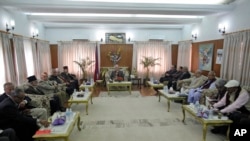Nepal's top political leaders met Monday with representatives of the Madhesi ethnic group who are protesting against the country's new constitution to try to end a months-long crisis, but no agreement was reached.
The protesters have imposed a general strike in much of southern Nepal and blocked a key border point with India, causing a shortage of fuel and other goods in the Himalayan nation. They are demanding a bigger state than granted in the new constitution and greater representation in the government.
After Prime Minister Khadga Prasad Oli and top leaders in the coalition government and the main opposition Nepali Congress party held discussions Monday with Madhesi leaders, both sides said there was no agreement reached but pledged to continue with talks.
Laxman Lal Karna, a Madhesi leader, said they agreed to meet again Wednesday night to discuss their key demands.
"We told the government to stop using force to stop our protests and peace rallies," Karna said. "The government is yet to even implement the two agreements reached in a previous meeting on providing free treatment for wounded protesters and monetary compensation for families of those killed. Our talks today made no progress in resolving anything."
The government side, however, appeared more optimistic about the talks.
"The meeting today has helped create a conducive environment between the three sides," said Narayan Kaji Shrestha of the United Communist Party of Nepal Maoists. "Though no agreement was reached today, we have all reached an understanding that there would be continuity to the talks."
Madhesis say the new constitution unfairly divides Nepal into seven states with borders that cut through their ancestral homeland. They want the states to be larger and to be given more autonomy over local matters.
At least 50 people have been killed in the protests since August.
The United Nations' children's agency warned Monday that more than 3 million children under the age of 5 in Nepal "are at risk of death or disease during the harsh winter months due to a severe shortage of fuel, food, medicines and vaccines."
UNICEF said in a statement that the Nepalese government's regional medical stores had already run out of vaccines against tuberculosis, and that stocks of other vaccines and antibiotics were critically low.
It said the 125,000 newborns expected in Nepal in the next two months are at particular risk, with ambulance services hit by the fuel shortage, resulting in a drop in births in hospitals and health centers. The lack of fuel for heating also increases the risk of hypothermia and death for newborn babies, it said.









